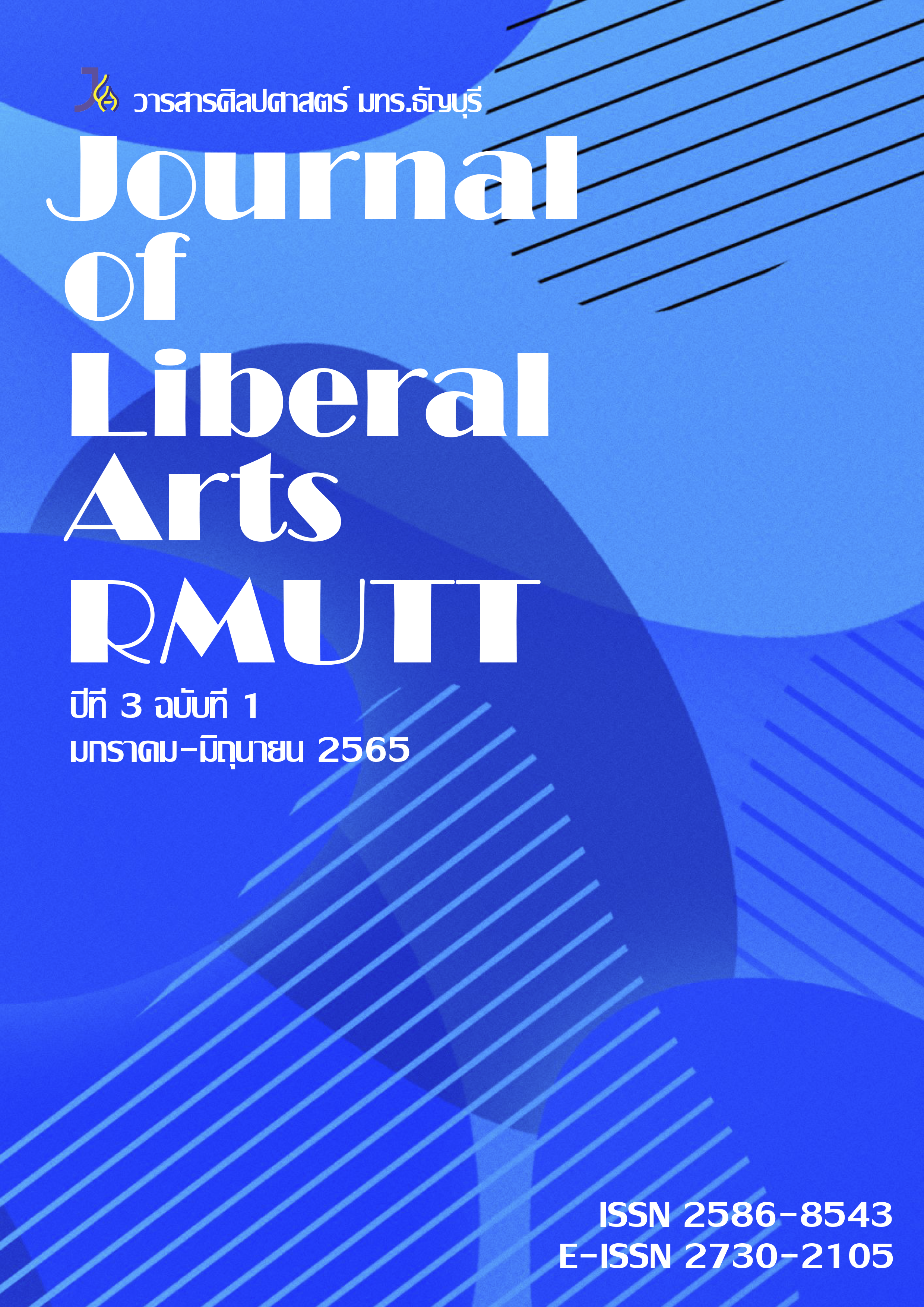The Era of Adaptation of Human Resource Management
Keywords:
adaptation, management, human resourcesAbstract
This academic article aims to study human resource management in the era of change. The next era of human resources human resource management process Benefits of impact studies and strategies in human resource management Human Resources in the 4.0 Era Business and work perspectives today will focus on talented people. flair at work Business information management and social strategies are indispensable. Therefore, the human resource department must rely on technology to help improve the employee experience. Empowering personnel Keep people engaged and adaptable in the ever-changing business environment.
References
จิรประภา อัครบวร เเละคณะ. (2552). การจัดการความรู้ (พิมพ์ครั้งที่ 3). กรุงเทพมหานคร: สำนักงานคณะกรรมการพัฒนา
ระบบราชการ.
ชวลิต ศุภศักดิ์ธำรง. (2561). บทบาทของฝ่ายการจัดการในการพัฒนาทรัพยากรมนุษย์. Veridian E-Journal, Silpakorn
University ฉบับภาษาไทย สาขามนุษยศาสตร์ สังคมศาสตร์ และศิลปะ, 11(2), 1702-1713.
ชัยรัตน์ ชามพูนท, กมลพร กัลยาณมิตร, สถิตย์ นิยมญาติ และทัศนีย์ ลักขณาภิชนชัช. (2564). การพัฒนาทรัพยากรมนุษย์
ในยุคการเปลี่ยนฉับพลันทางดิจิทัล. วารสารครุศาสตร์ปริทรรศน์ฯ, 8(1), 195-208.
ฑัมม์พร นิพนธ์พิทยา. (2561). ความสำคัญของการวิจัยทรัพยากรมนุษย์. วารสารวิจัยวิชาการ, 1(2), 121-136.
ทนงค์ศักดิ์ แสงสว่างวัฒนะ, ณัชนันทน์ ศิริไสยาสน์ และโชติ บดีรัฐ. “New Normal” วิถีชีวิตใหม่และการปรับตัวของคนไทย
หลังโควิด-19 : การงาน การเรียน และธุรกิจ. วารสารการบริหารการปกครองและนวัตกรรมท้องถิ่น, 4(3), 371-386.
ธนาสิทธิ์ เพิ่มเพียร. (2564). การสร้างประสบการณ์ที่ดีแก่ผู้สมัครงานแนวโน้มการสรรหาบุคลากรที่ผู้บริหาร HR ต้องรู้.
วารสารปัญญาภิวัฒน์, 13(1), 267-278.
ประคอง สุคนธจิตต์. (2562). ทรัพยากรมนุษย์ยุค 4.0. วารสารมนุษยศาสตร์และสังคมศาสตร์นายเรืออากาศ, 7, 17-28.
ผกาวรรณ ไพรัตน์ และวิษณุพงษ์ โพธิพิรุฬห์. (2564). อิทธิพลแนวทางปฏิบัติด้านการจัดการทรัพยากรมนุษย์ต่อพฤติกรรม
การสร้างนวัตกรรมในการทำงาน: การทบทวนวรรณกรรมอย่างเป็นระบบ. National & International Conference, 2(14), 486-495.
พัชรกันต์ นิมิตรศดิกุล และวิโรจน์ เจษฎาลักษณ์. (2559).กระบวนการบริหารทรัพยากรมนุษย์ของมหาวิทยาลัยราชภัฏ
นครปฐม. Veridian E-Journal, Silpakorn University ฉบับภาษาไทย สาขามนุษยศาสตร์ สังคมศาสตร์
และศิลปะ, 9(3), 631-652.
พิชญ์สินี มะโน. (2562). ผลกระทบจากการเปลี่ยนแปลงในยุค DIGITAL DISRUPTION ต่อการศึกษา.
วารสารครุศาสตร์อุตสาหกรรม, 18(1), 1-6.
ภัทราวดี ปรีจำรัส. (2564). ผลกระทบของการบริหารทรัพยากรมนุษย์เชิงรุกที่มีต่อผลการดำเนินงานของธุรกิจโรงแรม
ในประเทศไทย (วิทยานิพนธ์ปริญญาบริหารธุรกิจมหาบัณฑิต). มหาวิทยาลัยมหาสารคาม, มหาสารคาม.
ภิราช รัตนันต์. (2558). พันธกิจและบทบาทของการบริหารทรัพยากรมนุษย์ในองค์การ. วารสารวิชาการและวิจัยสังคมศาสตร์,
(30), 1-16
วิชุดา สร้อยสุด, เมธินี อินทร์บัว, จีรภา มิ่งเชื้อ, ยุวดี เคน้ำอ่าง และโชติ บดีรัฐ. (2564). การจัดการทรัพยากรมนุษย์
หัวใจสำคัญของการขับเคลื่อนองค์กรยุคปัจจุบัน. .Journal of Modern Learning Development, 6(5),
-352.
วิภัสสร ยอดยิ่ง. (2564). บทบาทของนักบริหารทรัพยากรมนุษย์ในการรับมือกับสถานการณ์แพร่ระบาดของเชื้อไวรัส
โคโรน่า 2019 (COVID-19) (สารนิพนธ์ปริญญาการจัดการมหาบัณฑิต). มหาวิทยาลัยมหิดล, นครปฐม.
สมบูรณ์ โตจิตร. (2564). บทบาทผู้นําในการพัฒนาองค์การ. วารสารการบริหารการศึกษา มมร.วิทยาเขตร้อยเอ็ด, 1 (3),
-70.
สมพิศ ทองปาน. (2559). HR เชิงรุกในยุคของการเปลี่ยนแปลง. วารสารบัณฑิตศึกษา มหาวิทยาลัยราชภัฏวไลอลงกรณ์
ในพระบรทราชูปถัมภ์, 10(3), 265-258.
อรรนพ เรืองกัลป์ปวงศ์ และสราวรรณ์ เรืองกัลป์ปวงศ์. (2564). บทบาทใหม่ของผู้นำการจัดการทรัพยากรมนุษย์ในยุค
เศรษฐกิจดิจิทัล. วารสารมนุษยศาสตร์และสังคมศาสตร์ มมร วิทยาเขตอีสาน, 2(3), 64-77.
Aslanertik, Banu Esra & Çolak, Murat. (2021). The Link Between Sustainability Reporting and The Core
Characteristics of Sustainable Human Resource Management. International Journal of
Contemporary Management Research Article, 57, 15-24. Retrieved From https://sciendo.com/pdf/10.2478/ijcm-2021-0010
Azizi, Mohammad Reza, Atlasi, Rasha, Ziapour, Arash, Abbas, Jaffar & Naemi, Roya. (2021). Innovative human
resource management strategies during the COVID-19 pandemic: A systematic narrative review approach. Heliyon, 7(6), e07233. Retrieved from https://doi.org/10.1016/j.heliyon.2021.e07233
Budhiraja, Sunil, Varkke, Biju & McKenna, Stephen. (2021). Work–life balance indicators and talent
management approach: a qualitative investigation of Indian luxury hotels. Employee Relations: The International Journal© Emerald Publishing Limited, 0142-5455. DOI 10.1108/ER-05-2021-02.
Fenech, Roberta. (2022). Human Resource Management in a Digital Era Through the Lens of Next Generation
Human Resource Managers. Journal of Management information and Decision Sciences, 25(S1), 1-10.
Higgins, Jeff. (2020). New Era for HR, A New Human Capital Reporting Standard. Retrieved on 25 May,
, from https://www.hcmi.co/post/a-new-era-for-hr-a-new-human-capital-reporting-standard
Lee, Soo-Hoon. (2021). An Attention-Based View of Strategic Human Resource Management. Academy of
Management Perspectives, 2(35), 237-247.
Downloads
Published
How to Cite
Issue
Section
License
Copyright (c) 2022 Journal of Liberal Arts RMUTT

This work is licensed under a Creative Commons Attribution-NonCommercial-NoDerivatives 4.0 International License.









